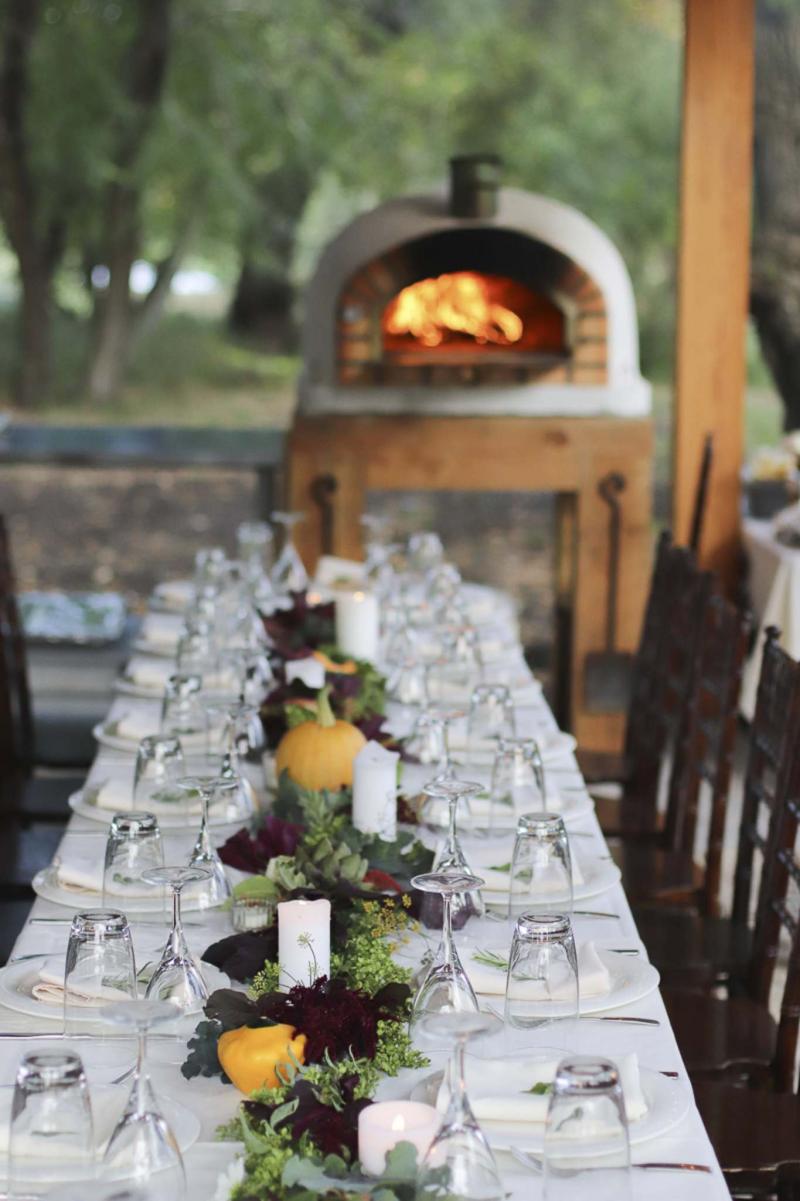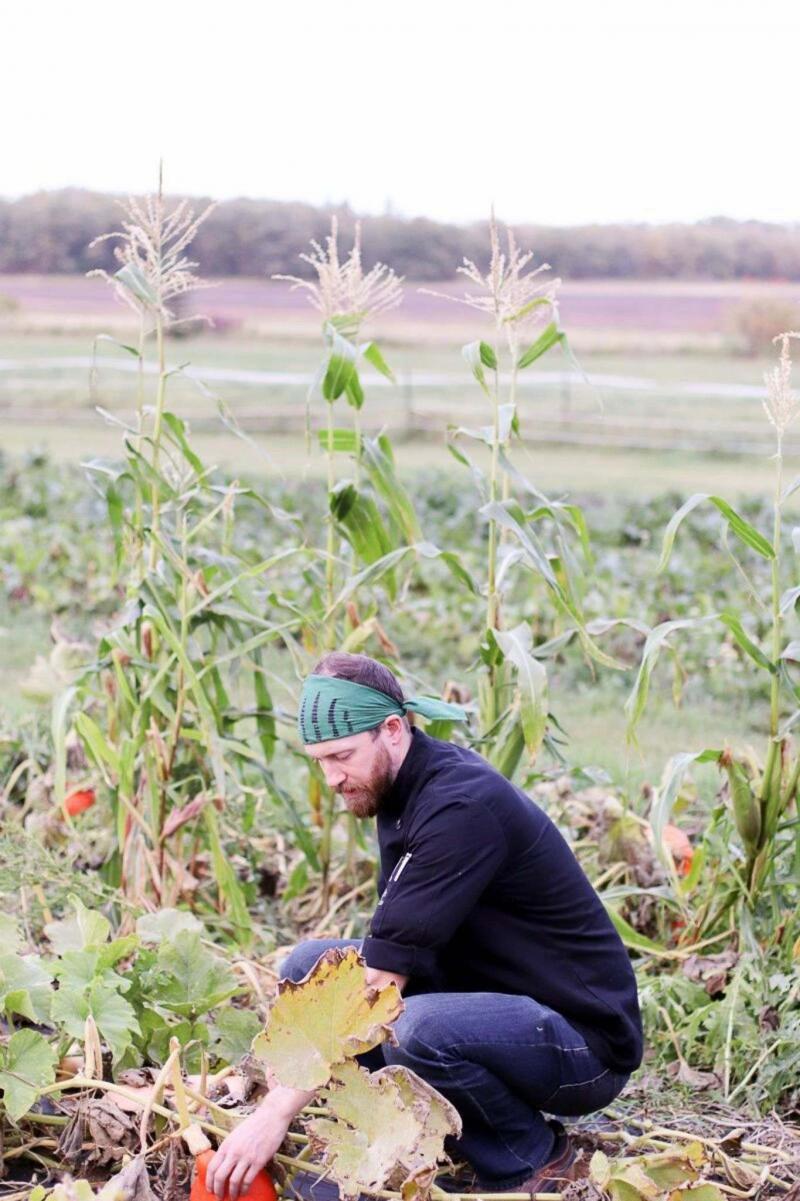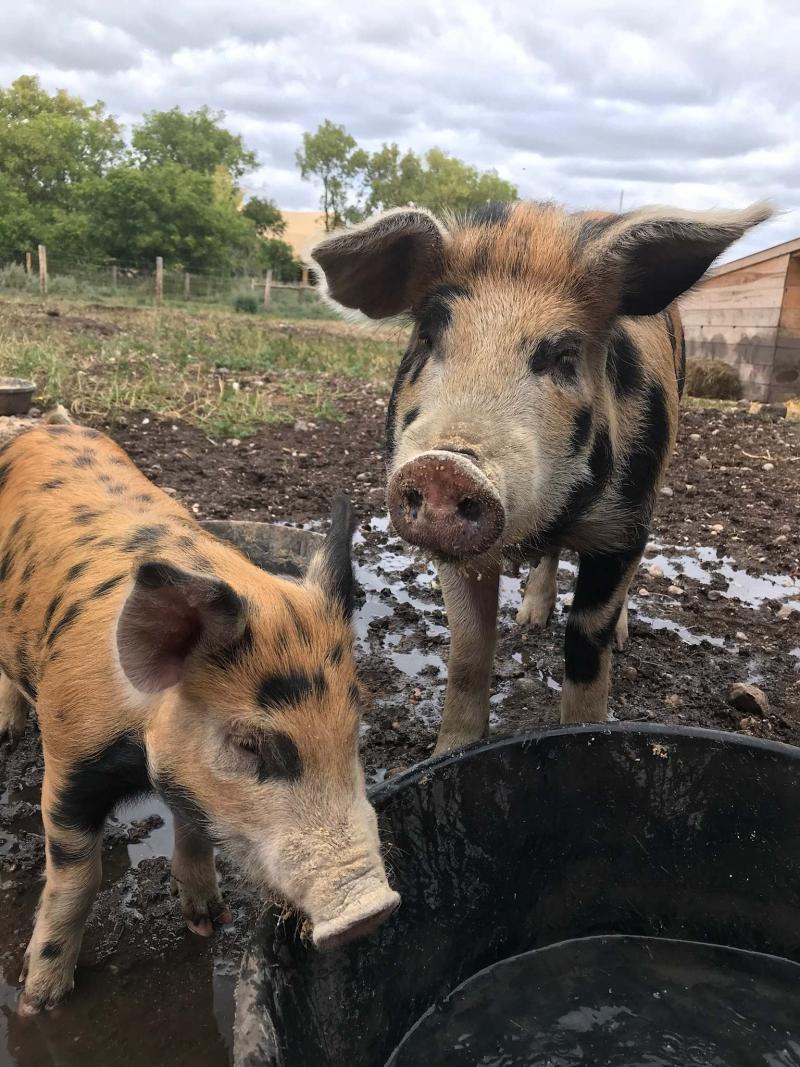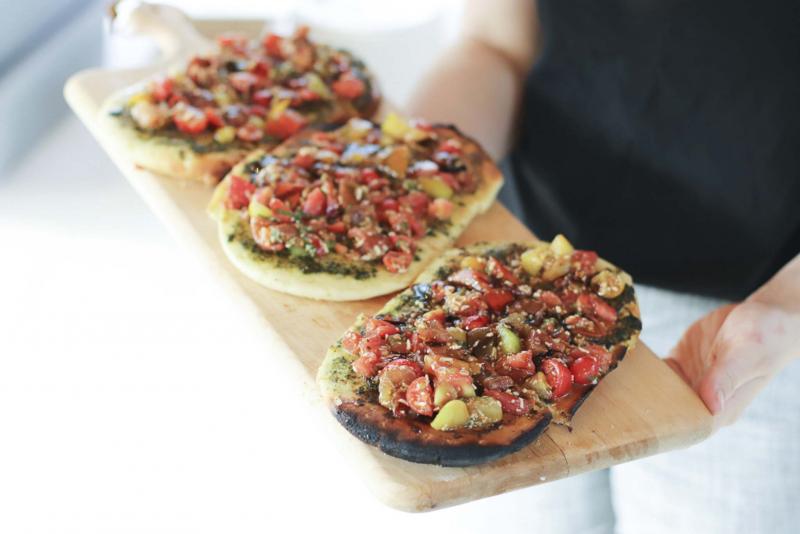
Red kuri squash and cardamom pie with golden raspberries and candied sage.

Katrina Klassen
At Oak Knoll Farm, the table is set for a new farm-to-table concept that will provide farm-fresh ingredients for the restaurant at Pineridge Hollow.

PHOTOS BY Katrina Klassen
Pineridge Hollow’s chef Colin Dick has the pick of the crop at Oak Knoll Farm for all of his delicious recipes.

Katrina Klassen
Pastured pigs at Oak Knoll Farm include Berkshire and Hereford breeds.
I’m always surprised if I meet someone who says they have yet to visit Pineridge Hollow. Located off the beaten path at the southern edge of Birds Hill Park near Oakbank, in the heart of an area that boasts both beautiful scenery and a confluence of sand and gravel operations, Pineridge Hollow is a place you want to return to over and over again.
Visitors go for the great food as well as the natural countryside setting — a gracious turn-of-the-century style carriage house surrounded by trees, walking trails and an open vista that beckons with layers of flowering perennials.
Owner Jan Regehr opened Pineridge Hollow on her family’s acreage in 1992. Guests visit the thriving restaurant, which feeds close to 500 people daily during its biggest season — spring through to Christmas — but also dip into the adjacent, ever-expanding retail store to shop for gift items, clothing and high-end furniture. But again, the main attraction is the food, which is known for its Prairie flavours.
Now Regehr is serving up something entirely new. She and her husband Ralph purchased a 53-acre property a few kilometres away from Pineridge Hollow and have launched a new business called Oak Knoll Farm. Based on the farm-to-table concept, Oak Knoll Farm was created to grow and raise food for the restaurant at Pineridge Hollow.
It’s a family affair. Daughter Katrina Klassen, who is the vice-president of Pineridge Hollow, purchased five acres, including the 105-year old house that sits on the property. Further into the well-treed property is the framework of the Regehr’s new house, a modern Swedish farmhouse that is in the process of being built.
The main focus of the Regehrs’ energy and passion, though, is their new and innovative enterprise, Oak Knoll Farm, where they are growing not only fruits, vegetables and flowers, but also raising heritage pigs, chickens and goats. With many more ideas still in the planning stages, Jan and Ralph Regehr are four months into a sabbatical from the day-to-day operations of their separate businesses (Ralph is CEO at Woodland Supply).
Fuelling all of their ideas, Jan said, is the desire to impact the way food is grown through the practices of regenerative farming techniques of sustainable agriculture and the philosophy of permaculture. Simply put, she said on my recent visit to Oak Knoll Farm, it means putting more back into the land than you take out.
Although Oak Knoll Farm is a working farm, it also includes a community gathering space. A heavy timber frame pergola provides shelter to the area, which includes a wood-fired pizza oven and a smoker. Visiting groups will be able to tour the orchard and gardens.
"We want Oak Knoll Farm to become an educational place that motivates people to not only reconsider the way we farm," said Regehr, whose childhood was spent growing up on a farm, "but also what we are eating and the idea that we are what we eat."
In permaculture, all systems benefit and support one another. At Oak Knoll Farm, pastured chickens, in the range of 400, have access to the vegetable gardens where they can forage as well as protect crops from bugs.
"Of course," Regehr said, "the chickens are fertilizing the soil in the gardens, too."
These are Bielefelder chickens, which have earned the nickname uber chicken, because they can lay more than 200 eggs per year, many of which have double yolks. Pastured pigs graze in the fields, but also among the many treed areas of the property. The Regehrs are breeding two purebred Berkshire sows with a 136-kilogram purebred Hereford for high-quality, leaner pork for their restaurant.
On my visit, Dwarf Nigerian goats stood outside a unique octagonal wooden structure with a rich, time-worn patina, which doubles as a shelter. The milk these personable miniature dairy goats produce has the highest levels of butterfat and tastes richer and creamier than types that have a tangy flavour. The Regehrs want to get into cheese making, too.
The Regehrs have created a fruit and berry orchard. The site of the fruit orchard is reminiscent of a walled garden with protection from the elements provided by rows of mature trees on all four sides. The previous owner — who, at age 95 when he sold the property to the Regehrs, had lived there most of his life — planted an enormous diversity of trees throughout the extensive property.
In the orchard and vegetable gardens, the nutrient-rich soil contains well-rotted manure. Well-aerated layers of straw and wood chips help to conserve moisture and reduce weed growth. In the orchard, nitrogen-fixers such as seabuckthorn and honeylocust grow among Honeycrisp apple trees. The Regehrs are also growing apricot and pear trees. Small fruits include saskatoons, blueberries, raspberries, cherries, strawberries and more than 800 haskap berry plants.
The orchard will also see the addition of numerous flowering shrubs, including hydrangea, Bridal Wreath spirea and elderberry, which will be used for floral arrangements. The Regehrs are also interested in making cordials and liqueurs as well as their own tea blends.
The amazing number of varieties of tomatoes, peppers, squash and greens that grow under cover in high tunnels or in an open-field situation are harvested as they ripen and delivered fresh, only a stone’s throw away, to the restaurant at Pineridge Hollow. There, chef Colin Dick prepares creative, mouth-watering dishes such as heirloom tomato bruschetta made with a farm-fresh basil pesto on homemade flatbread or an impossibly delicious red kuri squash and cardamom pie with a seeded pie crust and garnished with farm fresh golden raspberries, candied sage and a spiced whipped cream.
With such a bountiful store of produce, the sky’s the limit. Dick said the seasonality of the ingredients keeps him on his toes and encourages him to up his game and create new and tantalizing flavours for his customers.
Row covers will ensure a steady supply of fresh produce well into December. Traditional methods of canning, curing, freezing, drying and pickling will be used to preserve the taste of summer.
"I have this very unique perspective because I’m a restaurant owner and so I can make this work for my restaurant," said Regher, who dreams of other restaurants adopting a local farmer. "Imagine how that would change our economics and the ability to succeed and grow businesses and develop those relationships. It would be so much more rewarding for a restaurant to actually connect with their grower rather than having product sourced from California and trucked in from an enormous distance."
The September issue of Produce Grower, in its 2018 State of the Industry Report, states that "time-pressed, foodie and health-focused consumers are constantly looking for ways to get the produce they want and need". An 18 per cent increase in the sale of finished produce to restaurants, it states, speaks to a shift in catering to more customers’ individual wants and needs. Oak Knoll Farm and Pineridge Hollow are at the leading edge of Manitoba’s farm-to-table movement.
Follow their story at oakknollfarm.ca. Bon appétit.
colleenizacharias@gmail.com




